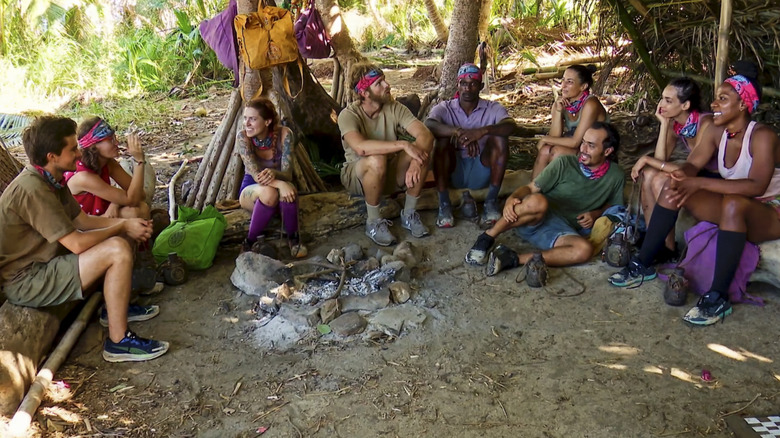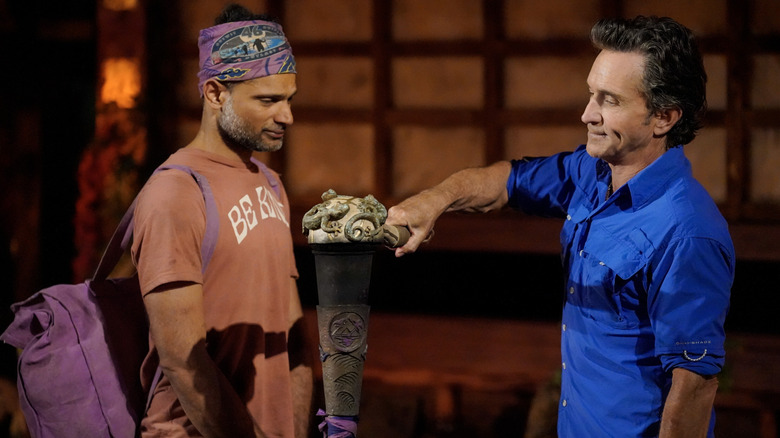One Survivor Change Fixed The Series' Biggest Problem, According To Jeff Probst
Now in its 46th season, "Survivor" is one of the most popular and enduring reality competition shows in the history of the genre — and host Jeff Probst says one initiative implemented in 2020 improved it significantly.
That year, the world, shaken by the death of George Floyd — a Black man murdered in police custody in Minneapolis — underwent a serious reckoning concerning racial quality, and "Survivor" made itself a part of that discussion. In 2020, George Cheeks, the CEO and president of CBS, decreed that 50% of all "Survivor" contestants needed to be BIPOC, an acronym which stands for "Black, Indigenous, and people of color."
"That will go down as one of the most positive and significant changes ever in 'Survivor,'" Probst said during on a panel for Contenders TV, per Deadline, on April 20. "More people are applying now than ever, and it's going up every season in every single category — African-American, East Asian, Middle Eastern, South Pacific Islander, Latino/Hispanic, Asian. it's the perfect illustration of what we say all the time, which is representation matters."
According to Probst, this change has also emboldened potential contestants to apply, which is such a heartening result of the new policy. "Now we have people applying to be on the show saying, 'I never saw anybody who looked like me. Now I do and now I realized I can do it too,'" Probst said.
Survivor's longevity is only aided by its diversity initiative
Making sure that "Survivor" is much more diverse — an initiative which has led to excellent groups of contestants since 2020 — isn't even the only change it's implemented, though the other was done onscreen by Jeff Probst himself. In Season 41, Probst welcomed contestants to a challenge by saying the phrase he's said for years: "Come on in, guys!" Then, he asked the contestants what they thought, admitting that though he loves the phrase and it's "part of the show," he wanted to be "of the moment" and be respectful to all gender identities. "In the context of 'Survivor,' is a word like guys OK? Or is it time to retire that word?" he asked at the time. After a truly thoughtful discussion, Probst decided to change his greeting to "come on in," cutting the word "guys" from the equation.
Ultimately, changing "Survivor" for a modern world has been a net positive, and Probst told the panel that he also just thinks that the show's success is thanks to its enduring formula — a formula only aided by more diverse contestants. "You take a group of strangers and force them to rely on each other while voting each other out," Probst mused. "'Survivor' is us. It's a reflection of us. Yeah, it's a game, but it's also us. A group of people form a society and try to figure it out. Sometimes that storm is real. Then I think our casting is phenomenal and our storytelling is really good."
Survivor's 46th season has had some standout players — and Jeff Probst discussed one of the worst
"Survivor 46" is well underway — all three tribes have merged, as of this writing, while contestants duke it out each week to stay in the game and ultimately become the Sole Survivor and winner of $1 million — and Jeff Probst also took some time at the panel to discuss one of its most noteworthy contestants thus far. Bhanu Gopal, who began Season 46 on the unlucky Yanu tribe and immediately proved that he was uniquely terrible at the game. Bhanu was unable to keep secrets, awful at challenges, and had zero strategy; when it came time for him to leave, his castmates didn't even need to hold a formal vote, but simply dismissed him.
"[H]e didn't know how to play, and they all saw it," Probst recalled of Gopal, whose backstory — he grew up impoverished in India — was extremely touching. "He was so bad he started costing other people because now he has information and doesn't know I'm not supposed to share it. When he left, it was painful for him."
"We produced and edited it as though it was a spiritual death, as he was going through the five stages of grief," Probst continued, explaining the producers' take on Gopal's situation. "We covered it with a big drone shot so you could just see him alone as he looks up to God and says, 'Why did you put me here if you wanted me to fail?' That's true vulnerability. He has a relationship with his god. He's still asking these questions. That's why I still love 'Survivor.'"
"Survivor 46" airs new episodes on Wednesdays at 8 P.M. on CBS.


